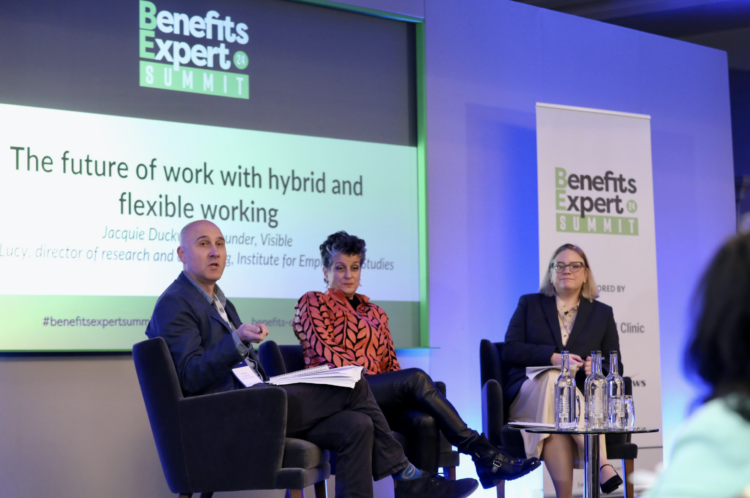Hybrid and flexible working has become the standard for many but companies resisting this shift may struggle to attract and retain top talent as demand for skilled workers grows.
Dan Lucy, director of HR research and consultancy at the Institute for Employment Studies (IES), and Jacquie Duckworth, founder of Visible, talked about how these shifts are changing workplaces, especially for midlife and highly skilled workers.
Lucy noted that hybrid working is becoming the norm for many employees, with 28% of the workforce balancing office and home work. This change is especially important for senior and highly skilled occupations since it gives workers—especially those who have caregiving responsibilities—more freedom.
He said: ”The people who tend to work hybrid tend to be fathers and mothers with caring responsibilities. They are individuals who need to juggle work with taking care of children, elderly parents, or other dependents. The hybrid model provides them with the flexibility to manage their professional commitments while also fulfilling their family obligations, offering them the ability to work from home on certain days and be present for their loved ones when needed.
“This demographic is increasingly seeking jobs that offer this level of flexibility, as it supports a better work-life balance and reduces the strain of having to choose between professional responsibilities and family duties.”
Various arrangements that allow employees to have control over their schedules are referred to as flexible working arrangements. Lucy highlighted that many graduates value flexibility above more pay, making it a crucial component in attracting talent, particularly from younger generations.
“Graduates would sort of give up a pay rise for increased ability to work flexibly. It’s no longer just about the salary or the benefits package when it comes to attracting talent. Many younger workers are now looking for workplaces that recognise the importance of flexibility in their lives.
“They understand that a flexible work schedule, whether it’s the ability to work remotely, adjust hours based on personal commitments, or even take advantage of flexible leave policies, is invaluable in creating a sustainable career that balances both work and personal life.”
Duckworth drew attention to the difficulties experienced by midlife professionals, particularly women over 45, who are frequently marginalised because of caregiving responsibilities or social expectations. She argued that this group has a lot to give and that flexible work arrangements can enable them to return to the workforce and make a valuable contribution.
She said: “45 plus women… deliver commercial upside to organisations. Despite the fact that many women in this age group are pushed out of the workforce prematurely due to family responsibilities, caregiving duties, or outdated perceptions about their capabilities, these women possess a wealth of experience that can greatly benefit organisations.
“They bring expertise, resilience, and a different perspective that can drive growth and innovation within a company. Businesses that tap into this talent pool and create an environment where these women can thrive and contribute will find that the commercial benefits far outweigh any perceived drawbacks.”
Duckworth highlighted the growing need to attract and retain older workers, especially those over 60. Flexible working arrangements are essential for enabling these experienced employees to remain in the workforce, benefiting both individuals and organisations.
“The 60-plus generation is just getting bigger and bigger. If you do not encourage mid-life demographic back into the workplace the government will be left to pick up the slack. This demographic is not only growing, but they also bring a level of experience that younger workers simply can’t match.
“As the traditional workforce shrinks, businesses need to realise that older workers are a valuable resource. Failing to engage them and provide opportunities for them to contribute to the workforce could lead to a significant gap in productivity.
“Additionally, if organisations do not offer flexible work options that cater to older employees, we risk seeing an increasing reliance on government support systems, as these workers may not have the means to sustain themselves otherwise.”
Flexibility is essential for the workplace of the future, according to both speakers. Lucy cautioned that as the need for qualified experts increases and more employees choose flexible schedules, businesses that oppose hybrid models—like those that call for five days in the office—may find it difficult to draw in top talent.













